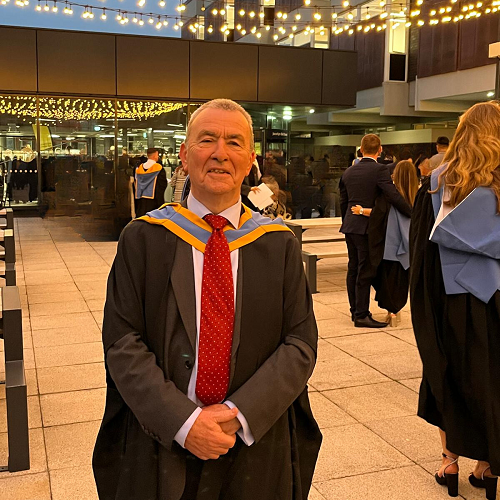Why did you choose to study at the University of Strathclyde?
I had enjoyed researching family history for many years, although due to work commitments this was sporadic. The result was several inconsistencies in my family tree as well as the odd persistent brick wall. When planning for retirement, I wanted to give more time to family history but was aware I would benefit from enhanced genealogical skills and improved awareness of source material. I also wanted to bring academic rigor to my passion and curiosity for the subject.
I investigated the courses available and was attracted to the Strathclyde Masters as this course provided a solid foundation in all aspects, and through the dissertation, a chance to study a specific topic in more detail. In addition, it enabled me to register as a qualified genealogist and support others seeking to explore their family histories.
I decided to apply for the full-time course as I was conscious that when I retired, I might be at a ‘loose end’ following a busy career in the cultural sector.
What did you enjoy most about your course?
The course is well structured, covers all aspects of genealogy and guides the student through the complex range of source material. The Graduate Certificate is a ‘handheld’ introduction to the subject, whilst the Diploma enables the student to explore specific areas in more depth, utilising skills taught at Certificate level. The Dissertation provides an opportunity for the student to lead their own research and put their skills to full use in a way that contributes back to the discipline.
The course notes are excellent, and I would recommend they are downloaded and kept for future reference. I particularly enjoyed the two study visits (Glasgow & London), which provided an up-close chance to see various repositories - and meet other students. As a distant learning course, not all students can attend, but it is well worth it if you can find the time and expense.
What advice would you give to a prospective student coming to study your course?
A lot of material and information is given out from the start, especially at the Graduate Certificate level. You will not be able to read it all, so don’t panic! Be selective, learn to skim read, and pick out the vital information that you need for the assignment set. If in doubt ask your tutor for guidance, they are there to help.
What specialist knowledge / professional skills have you developed studying your course?
I have a much better understanding of where to look for different sources, what sort of information I am likely to find and importantly, how to use it. Referencing is a challenging but vital skill, enabling others to find the sources you have used. Although not easy, it’s worth getting this right at an early stage. Creating a research plan, maintaining a search log of what was and wasn’t found, is an essential skill for methodical, effective and efficient research. When I was doing my dissertation, this proved invaluable.
What are your amibitions for the future and how do you think your time at Strathclyde will help you achieve your goals?
Undertaking the Master’s has certainly fulfilled the objectives I set myself at the start of retirement. These were to
- evaluate, refresh and improve my skills in genealogical research,
- undertake an academic course at postgraduate level,
- gain a deeper and more critical understanding of the discipline, its literature and professional practice, and
- register as a professional genealogist to provide expert knowledge and support to others.
I am more confident in my ability to conduct complex genealogical studies. Initially I am looking to write up the life of my fifth great-grandfather, a fascinating character but also a conundrum in my family tree for many years. But after this, who knows where my skills might take me!
Any final points, or words of wisdom?
The Master’s full time can be an intensive, challenging experience, but if you are passionate about genealogy and love puzzles, you will find this course great fun and very rewarding. Before embarking, my words of wisdom would be.
- Decide if you want to do the course, full-time, part-time or modular. If you are not in a rush to complete, then consider the part-time or modular options, especially if you desire to absorb as much of the material as you can. Full time is great fun, but it is full-on!
- Whichever option you choose, don’t panic! Take your time, be selective in your reading and focus on the assignment in hand.
- Keep all your course notes and reading lists for later reference – they will provide an excellent digital library and signpost you to other sources.
- Develop a specific interest and focus on that. The course is multi-disciplinary and there will be some areas that you are more interested in than others. For me the application of DNA was a struggle, but I have developed a sound foundation in the subject which I will build on when the opportunity arises.
- Use the Tutors. That’s why they are there!
Most of all – enjoy!
